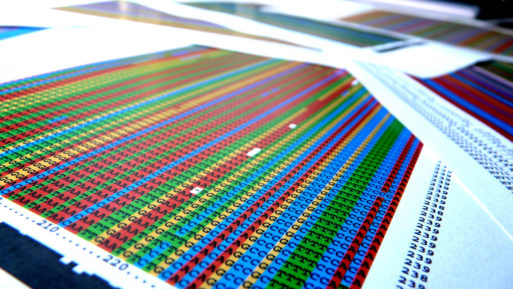In a move that’s already stirring controversy, the FDA has given its approval to a home testing kit that lets users screen themselves for certain breast cancer genes without a doctor’s prescription. The test is marketed by the genetic testing firm 23andMe, which offers DNA testing on saliva samples that customers collect at home. The company already offers dozens of health-related DNA screenings, including tests that assess the risk for macular degeneration, celiac disease, Parkinson’s disease and late-onset Alzheimer’s disease. But this is the first time to FDA has given its approval for a direct-to-consumer cancer screening test.

DNA sequencing
Credit: Aban tech via Youtube.com
To use the test, consumers simply purchase the kit from 23andMe for about $200. After collecting a saliva sample, they submit it to 23andMe, and the company performs the test. Test results are not released unless the customer specifically requests them, says 23andMe. The company also includes an educational module that aims to help the customer understand the results.
Limited Utility for Most Consumers
The approval of a direct-to-consumer cancer screening test is certainly big news. However, the FDA warns that the newly available test detects only an infinitesimal portion of BRCA mutations — three out of more than 1,000, according to an NBC News report. These three mutations are most prevalent in people of Ashkenazi Jewish descent, 2.5 percent of whom carry one of the three variants of the BRCA gene. Having one of the mutations is associated with a 45 to 85 percent risk of developing breast cancer by age 70, says 23andMe.
The test is “incredibly valuable valuable for those who might not be aware of their Ashkenazi Jewish descent or aren’t familiar with their family history of cancer,” said Anne Wojcicki, 23andMe co-founder and CEO. “But it’s important to understand that the majority of cancer is not hereditary; our test does not account for all genetic variants that can cause a higher risk of cancer; and people should continue with their recommended cancer screenings,” she added.
Wojcicki’s statement was echoed by the FDA, which warns consumers that a negative result on this one cancer screening test “does not rule out the possibility that an individual carries other BRCA mutations that increase cancer risk.”
Not a Smooth Path
The Food and Drug Administration’s approval of the 23andMe’s direct-to-consumer testing kit follows a long, contentious battle between the company and the FDA. In 2013, the FDA warned 23andMe that its Personal Genome Service was a “medical testing device” that had not been properly vetted by the agency. Of particular concern to the FDA was the BRCA test. In a letter to 23andMe signed by Alberto Gutierrez, Director of the Office of In vitro Diagnostics and Radiological Health, the agency said: “If the BRCA-related risk assessment for breast or ovarian cancer reports a false positive, it could lead a patient to undergo prophylactic surgery, chemoprevention, intensive screening, or other morbidity-inducing actions, while a false negative could result in a failure to recognize an actual risk that may exist.”

Actress Angelina Jolie had a double mastectomy after testing positive for a BRCA mutation, citing her “Jewish gene”
Credit: Cancillería Ecuador / Ecuador Foreign Ministry/via Wikimedia Commons
Since then, 23andMe has worked closely with the FDA to prove that its test is at least as reliable as genetic cancer screening performed in medical laboratories. And, according to the company’s press release, it has demonstrated greater than 99 percent levels of accuracy, reproducibility and repeatability. The company also added a warning about the limited applicability of the test to its marketing materials and appended the aforementioned educational manual to the BRCA results.
Empowerment or Chaos?
Accuracy notwithstanding, many geneticists and cancer specialists are concerned about home cancer screening and the implications of direct-to-consumer genetic testing overall. While proponents argue that such testing empowers the public and gives us more control over our health, the National Society of Genetic Counselor warns consumers that they should not make medical decisions based on home tests alone. “Consumers who test positive for these mutations need to be retested in a clinical setting under the supervision of a medical professional before moving forward with any medical decisions,” the group said.
Still, the genie is out of the bottle now and it’s unlikely to go back in. With this approval, the FDA has for all intents and purposes given the green light to any at-home genetic test that demonstrates a level of accuracy and reliability similar to approved laboratory tests. What this means for the future of the nation’s healthcare remains to be seen. But, as Dr. J. Leonard Lichtenfeld, M.D., of the National Cancer Institute says in his blog, it will certainly “add fuel to a growing fire about how we as a nation assess genetic risks for cancer, and whether society is prepared for what is inevitably going to become a genomic-influenced and informed culture of health.”

 New 23andMe Cancer Screening Test Approved
New 23andMe Cancer Screening Test Approved


 Our Annual Seven Holiday Gifts for Someone Who Is Grieving, 2024 Edition
Our Annual Seven Holiday Gifts for Someone Who Is Grieving, 2024 Edition
 “Making Mobiles” by Karolina Merska
“Making Mobiles” by Karolina Merska
 “Hands Up to the Sky” by Michael Franti & Spearhead
“Hands Up to the Sky” by Michael Franti & Spearhead














